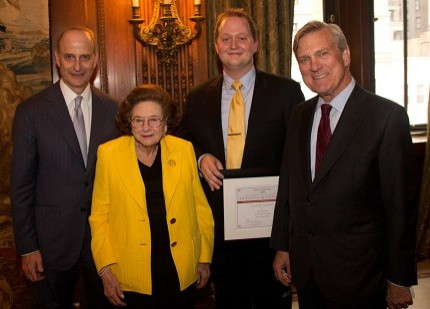Q&A With Shane Harris on the Powers and Limits of State Spying

Shane Harris won the New York Public Library's Helen Bernstein Book Award For Excellence in Journalism Tuesday night for The Watchers: The Rise of America's Surveillance State. In it, he draws on his access to key government insiders to chronicle the ascent of that state over the past quarter-century, tracing its origins to Admiral John Poindexter, who in 1983 dreamed of a system that would sift reams of data for signs of terrorist activity.
But that dream has become America's nightmare, and Harris' book makes the case that despite billions of dollars spent on this digital quest since the Reagan era, we still can't discern future threats in the vast data cloud that surrounds us all. But the government can now spy on its citizens with an ease that was impossible -- and illegal -- just a few years ago.
Harris is a senior writer at Washingtonian magazine, which he joined last year. Previously he was a staff correspondent for National Journal for five years. He was the winner of the 2010 Gerald R. Ford Prize for Distinguished Reporting on National Defense, and The Economist picked The Watchers (The Penguin Press, 432 pages) as one of its best books of 2010.
Since 1988 the Bernstein Award has been given annually to journalists whose books have brought clarity and public attention to important issues, events, or policies. It includes a $15,000 prize.
INTERNATIONAL BUSINESS TIMES: What's the significance of winning the Helen Bernstein Book Award for Excellence in Journalism for you?
SHANE HARRIS: I'm thrilled to be part of such an esteemed and talented group of finalists and past winners. I've admired their work for years. It just feels great to have worked on this book for so long, in the spirit of the journalism they all represent, and to be recognized for it.
IBTIMES: What got you started working on The Watchers?
HARRIS: After the 9/11 attacks, I was reporting on the intersection of technology and national security. The government was obsessed with finding some way to connect the dots about the next attack. I developed a lot of sources in the intelligence community and the tech industry who were trying to do that. And I was just fascinated, both by the enormity of the challenge they'd set for themselves as well as their audacity for taking it on. It was just a great story, full of compelling characters.
IBTIMES: Without giving away the store, how do you report a book like this, and peel back the layers of government secrecy? Is the main thing still getting to know good sources, and getting them to trust you?
HARRIS: That's the most important thing, yes. People will tell you a lot if you actually listen to them. If you do your homework and show them you're interested in what they think, they will engage you. That's how you build trust.
There's also a tremendous amount of telling information located in public documents. You just have to learn how to find it.
IBTIMES: What have readers been most troubled by after finishing The Watchers?
HARRIS: I think it's a split between those who are scared of the great surveillance power the government has, and those who are scared that as mighty as it is, it's still not good enough to stop many attacks.
IBTIMES: A year-plus on, do you think your book has raised Americans' consciousness of the spying their government is doing on them?
HARRIS: I think so. People are much more aware now of the government's power and its limitations. People who've read the book tell me they came away understanding this much better than they had before reading it.
IBTIMES: I was impressed to see that you also write fiction and have been a Sundance Film Festival screenwriting finalist. Where do you find the energy and time to do those kinds of writing in addition to your journalism work?
HARRIS: I've learned to prioritize without feeling badly about it.
IBTIMES: And finally, I was part of a sketch comedy troupe in college called Tastes Like Chicken. What was the name of yours?
HARRIS: Ha! That's great. Mine was the Lilting Banshees. A bit more obscure name I'd say.
Edward B. Colby is the Books section editor of the International Business Times. He can be reached at e.colby@ibtimes.com.
© Copyright IBTimes 2024. All rights reserved.





















